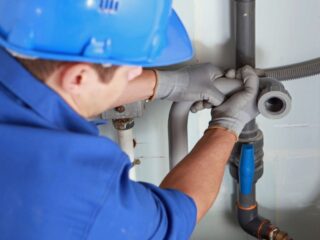
Industrial operations require a robust, well-designed Mechanical, Electrical, and Plumbing (MEP) infrastructure to function smoothly. In cities like Houston, where industrial growth is a key driver of the economy, MEP systems play a critical role in ensuring operational efficiency, safety, and sustainability. Whether it’s manufacturing plants, warehouses, or refineries, these systems provide the backbone for essential services such as heating, ventilation, electricity distribution, and water supply. Proper planning and implementation of MEP infrastructure are paramount for industrial facilities to meet regulatory standards and optimize performance.
Mechanical Systems: The Heart of Industrial Operations
Mechanical systems in industrial settings include HVAC (heating, ventilation, and air conditioning), refrigeration, and fluid management systems. In Houston’s humid and often scorching climate, reliable HVAC systems are not just a convenience but a necessity for both employee comfort and equipment preservation. A well-designed HVAC system can regulate temperatures in factories, ensuring that sensitive machinery remains operational and workers are productive.
Equally important is the fluid management system, which involves the distribution of compressed air, gas, and liquid systems critical to industrial processes. These systems need to be resilient to avoid operational delays. Choosing the right mechanical components, such as energy-efficient boilers and compressors, can also help reduce operational costs and improve sustainability efforts.
Electrical Systems: Powering Productivity
Industrial operations heavily rely on complex electrical systems to power machinery, lighting, and control panels. In an energy-intensive industrial environment, the design of electrical systems must account for both current power demands and future scalability. Houston’s industrial sector, which includes petrochemical plants and large-scale manufacturing, requires robust electrical infrastructure capable of handling high-voltage power distribution.
Reliable electrical systems also play a critical role in ensuring safety. These systems should be equipped with fail-safes, circuit breakers, and backup generators to minimize downtime during power outages or surges, which can lead to costly disruptions. Additionally, advancements in smart grid technology are increasingly being integrated into Houston’s industrial landscape, allowing for better energy management and efficiency.
Integrating renewable energy sources like solar panels or wind turbines can further reduce the strain on local grids while promoting sustainability.
Plumbing Systems: Ensuring Functionality and Compliance
In any industrial operation, efficient plumbing systems are essential for maintaining both functionality and compliance with environmental regulations. Houston’s industries, especially those in oil and gas, rely on well-structured plumbing networks for everything from water supply to wastewater treatment. Properly designed plumbing systems help manage both potable and non-potable water, steam, and chemical fluids critical to industrial processes.
A major challenge in industrial plumbing is the need to manage wastewater in a way that complies with local and federal environmental regulations. This includes the safe handling of hazardous materials, which often requires specialized filtration systems. For companies operating in Houston, where environmental sustainability is becoming increasingly significant, upgrading plumbing infrastructure to meet regulatory standards is vital. By investing in modern systems, companies can reduce water waste, avoid hefty fines, and support the city’s efforts to improve its environmental footprint.
Integration and Coordination: The Role of MEP Engineering Firms
One of the most challenging aspects of developing MEP infrastructure for industrial operations is integrating the various systems in a way that promotes efficiency and long-term sustainability. Each element—whether mechanical, electrical, or plumbing—must work together seamlessly. Poorly coordinated systems can lead to operational inefficiencies, increased maintenance costs, and safety risks. For industrial operations in Houston, the integration of MEP systems requires careful planning, expertise, and compliance with both local and federal standards.
Partnering with an experienced MEP engineering firm is crucial to overcoming these challenges. A good firm will have a comprehensive understanding of industrial requirements and local conditions, such as Houston’s climate and regulatory landscape. They will also be able to implement advanced technologies such as Building Information Modeling (BIM), which allows for better coordination and visualization of MEP systems. For example, integrating energy-efficient technologies like smart HVAC systems or renewable energy sources can result in significant cost savings over time. Choose Sumer Innovations as your expert engineering firm in Houston, to ensure that your MEP infrastructure is designed for optimal efficiency and reliability.
Addressing Houston’s Unique Industrial Needs
Houston is home to a wide range of industries, from petrochemical plants to advanced manufacturing. Each of these industries has unique requirements when it comes to MEP infrastructure. Petrochemical facilities, for instance, demand highly specialized HVAC systems that can manage hazardous gases and chemicals. On the other hand, food and beverage manufacturing plants need efficient refrigeration systems to maintain product quality. Addressing these specific needs requires both customization and expertise in MEP design.
Houston’s rapidly evolving industrial landscape also means that companies must be prepared for future expansion. MEP systems should be designed not just to meet current needs but to scale with the business. By incorporating modular systems and planning for potential expansions, businesses can reduce the need for costly overhauls down the line. Furthermore, by adhering to Houston’s increasingly stringent sustainability and safety standards, companies can build a competitive advantage.
Sustainability and Future Trends in MEP Infrastructure
As Houston’s industrial sector continues to grow, there is an increasing focus on sustainability. Industries are now expected to adopt more eco-friendly practices, and MEP infrastructure plays a key role in this transformation. Energy-efficient HVAC systems, smart electrical grids, and water-saving plumbing systems are just a few of the ways that industrial operations can minimize their environmental impact while reducing operational costs.
Looking ahead, the integration of renewable energy sources and smart technology into MEP systems will become increasingly important. The use of IoT (Internet of Things) devices for real-time monitoring and maintenance can significantly improve operational efficiency. For example, sensors can detect leaks in plumbing systems or identify energy inefficiencies in HVAC units before they become major issues. By staying ahead of these trends, industrial operators in Houston can ensure they remain competitive in a rapidly evolving market.
MEP infrastructure is the backbone of any industrial operation. A well-integrated system ensures not only operational efficiency but also compliance with environmental regulations and scalability for future growth. For businesses in Houston’s diverse industrial sector, choosing the right engineering partner can make all the difference in meeting these goals.














